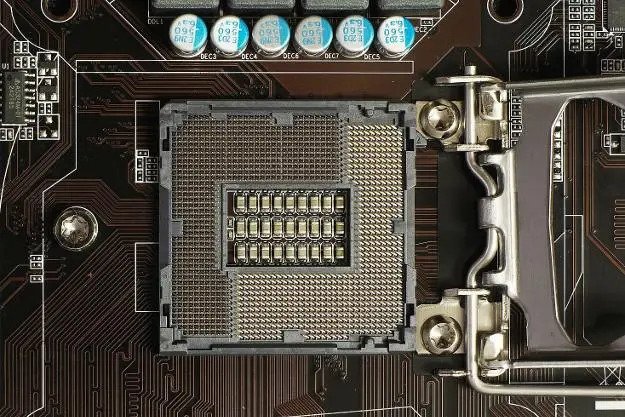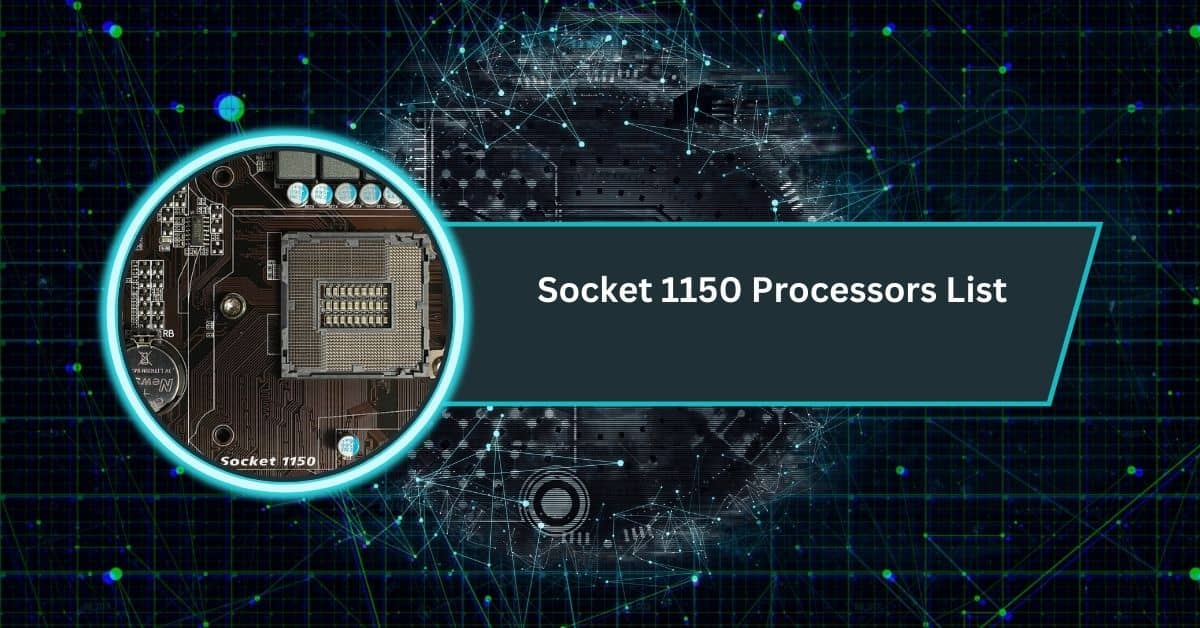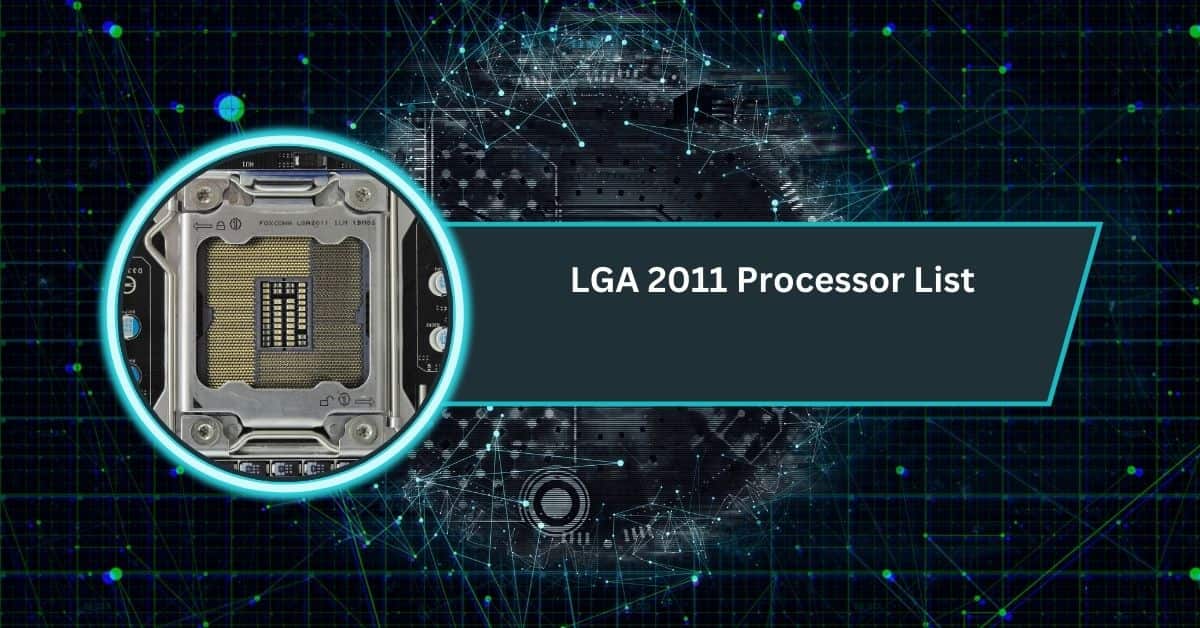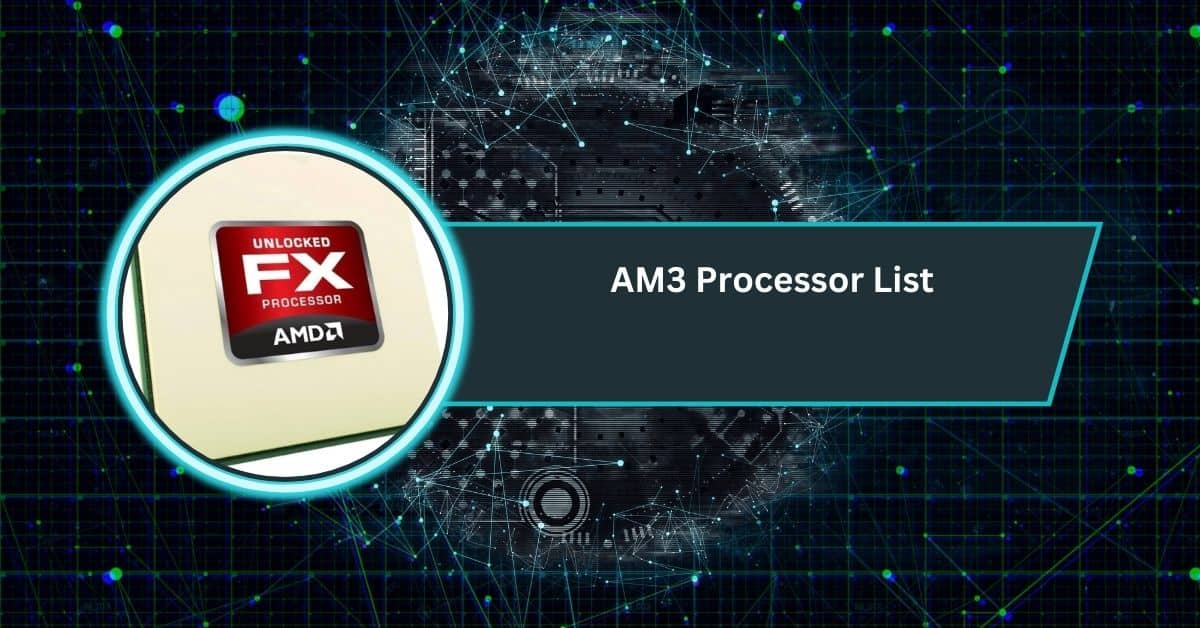Socket 1150 is a popular CPU socket introduced by Intel, supporting 4th and 5th generation processors, including the powerful Core i7, i5, and i3 models.
The Socket 1150 processor list includes Intel Core i7-4790K, Core i7-4770, i5-4690K, Pentium G3258, Celeron G1840, and more. These processors offer a range of gaming, productivity, and general computing performance on LGA 1150 motherboards.
In this article, we’ll dive deeper into the features, benefits, and performance of Socket 1150, along with some helpful tips for upgrading your system.
What Is Socket 1150?
Socket 1150, or LGA 1150, is a type of CPU socket designed by Intel. It was introduced in 2013 and is used for Intel’s 4th and 5th generation processors, Haswell and Broadwell.
The socket connects the processor to the motherboard, allowing the CPU to communicate with other computer parts.
Socket 1150 is popular for its solid performance and wide compatibility, making it a reliable choice for many desktop PCs.
Why Socket 1150 Is Still Relevant

Despite the availability of newer sockets, Socket 1150 remains popular because of its balance of performance and cost.
Many users still find that the processors for this socket offer great value, especially for gaming and general use.
The 4th and 5th generation Intel processors for Socket 1150, such as the Core i7 and Core i5, are powerful enough for most tasks. It also supports a wide range of affordable motherboards, making it a good choice for budget-conscious users.
Overview of Socket 1150 Processors
1. Intel’s Haswell and Broadwell Architectures
Socket 1150 supports two major architectures:
- Haswell (4th Gen): Introduced innovative features like enhanced integrated graphics and improved power efficiency.
- Broadwell (5th Gen): Focused on reducing power consumption and improving thermal efficiency.
2. Differences Between Haswell and Broadwell Processors
Haswell and Broadwell processors are part of Intel’s 4th and 5th generation series but have key differences. Haswell processors use a 22nm manufacturing process, while Broadwell uses a smaller 14nm process, making them more power-efficient and cooler.
Broadwell also offers better thermal management, meaning they consume less energy and run quieter than Haswell.
However, Haswell processors tend to be more affordable, while Broadwell offers slight performance and energy savings improvements.
Read Out: Whats The Best Processor For My B450 Aorus M: Exploring!
Popular Processors for Socket 1150
1. Core i7 Series
Intel Core i7-4790K
The Intel Core i7-4790K is a high-performance processor with a 4.0 GHz base clock speed, ideal for gamers and content creators.
It’s unlocked for overclocking, meaning you can boost its performance beyond standard speeds. It’s great for handling demanding applications and multitasking without lag or slowdown.
Intel Core i7-4770
The Intel Core i7-4770 offers excellent performance for both gaming and productivity tasks. With a base clock speed of 3.4 GHz, it easily handles multitasking and complex applications.
While it doesn’t have overclocking capabilities, it still delivers solid power and speed for users who need reliable performance.
2. Core i5 Series
Intel Core i5-4690K
The Intel Core i5-4690K is a strong processor with a 3.5 GHz base clock, ideal for gaming and mid-range tasks.
It is unlocked for overclocking, pushing it to higher speeds. It’s popular for enthusiasts who want power without spending too much.
Intel Core i5-4590
The Intel Core i5-4590 is a mid-range processor with solid performance for everyday use. Its 3.3 GHz base speed is great for web browsing, light gaming, and productivity work.
It’s budget-friendly and delivers reliable power without being too expensive for most users.
3. Core i3 Series

Intel Core i3-4160
The Intel Core i3-4160 is a budget-friendly processor with a 3.6 GHz base clock, perfect for light tasks like browsing the web and watching videos.
It’s a good choice for users who don’t need powerful processors but still want solid, everyday computing performance.
Intel Core i3-4370
The Intel Core i3-4370 is a small step up from the i3-4160, offering slightly better performance. With a 3.8 GHz clock speed, it handles basic multitasking well.
It’s ideal for those on a budget who need a processor for everyday tasks like office work and media consumption.
4. Pentium and Celeron Processors
Intel Pentium G3258
The Intel Pentium G3258 is a popular budget processor with overclocking capabilities. It’s a dual-core processor with a base clock of 3.2 GHz.
It’s great for basic gaming and can be pushed to higher speeds with overclocking, making it a good option for affordable performance.
Intel Celeron G1840
The Intel Celeron G1840 is an entry-level processor ideal for basic computing tasks like web browsing, email, and document editing.
It has a 2.8 GHz clock speed and is very affordable, making it perfect for users who need a simple, budget-friendly option for everyday tasks.
Features and Benefits of Socket 1150 Processors
1. Performance Capabilities
Socket 1150 processors deliver solid performance for most tasks, from gaming to productivity.
High-end models like Core i7 offer fast speeds, while Core i5 and i3 are great for budget-friendly systems. These processors can handle multitasking and demanding applications with ease.
2. Power Efficiency
Socket 1150 processors are energy-efficient, especially the Broadwell models built on a 14nm process. They use less power than older processors while still offering good performance.
This makes them ideal for users who want better battery life or lower electricity bills without sacrificing too much speed.
Must Read: Do Intel Processors Come With Coolers: A Detailed Answer!
3. Compatibility with Motherboards
Socket 1150 processors are compatible with many motherboards, making upgrades easier. Many older and newer motherboards support Socket 1150, so finding affordable, quality options is easy. Just make sure to check the chipset compatibility for smooth performance.
Comparing Socket 1150 with Other Sockets
1. Socket 1150 vs. Socket 1151
Socket 1151 supports newer processors with better power efficiency and more advanced features, like DDR4 RAM support.
While Socket 1150 processors still offer great value, Socket 1151 is better for those looking for more modern technology and higher performance.
2. Socket 1150 vs. Older Generations
Socket 1150 provides better performance and power efficiency than older sockets, like 1155. It supports newer processors and offers more features, such as improved integrated graphics. If you have an older system, upgrading to a Socket 1150 processor is smart.
Best LGA1150 CPUs (Practical Picks In 2025 For Used Builds)
If you have an LGA1150 board and want the best value/performance, here are the typical recommendations:
- Best for gaming (single-thread heavy): Intel Core i7-4790K — high clocks, unlocked multiplier, and strong single-thread performance make it the usual top pick for older LGA1150 systems. Availability in the used market is good and aftermarket coolers are widely compatible.
- Best for budget gaming / general use: Intel Core i5-4690 / i5-4670 — good balance of price and performance.
- Best for integrated-GPU or HTPC use: Intel i7-5775C (if your board supports Broadwell BIOS updates) — better iGPU (Iris Pro) and reasonable CPU performance for light gaming/media without discrete GPU.
- Best server/workstation alternative: Xeon E3-1270 v3 (or E3-12xx v3 family) — similar cores to Core i7 but sometimes cheaper and stable for 24/7 workloads; note many Xeons lack integrated graphics.
These “best” picks are defined by price/perf in the used market; exact availability and prices vary by region and time (check marketplaces like eBay/Newegg).
Gaming and Productivity with Socket 1150
1. Best Gaming Performance Processors
For the best gaming experience, the Intel Core i7-4790K and Core i5-4690K are excellent choices. They offer fast speeds and good multitasking.
These processors handle modern games smoothly and allow for overclocking, making them great for gamers who want reasonably priced performance.
2. Productivity and Workstation Applications
Socket 1150 processors, especially the Core i7 series, are great for productivity and workstation tasks. They can handle video editing, 3D rendering, and multitasking with ease. A Core i5 or i3 processor will work perfectly for basic tasks like office work.
Upgrading Tips for Socket 1150 Users

1. How to Choose the Right Processor
To choose the right processor, consider what you use your computer for. For gaming or heavy tasks, choose a Core i7. A Core i5 or i3 will save you money for general tasks or light gaming while offering solid performance.
2. Cooling and Overclocking Considerations
If you plan to overclock, ensure you have a good cooling system. Processors like the i7-4790K can run hotter when overclocked.
A quality CPU cooler prevents overheating and maintains system stability during high-performance tasks or gaming.
LGA 1150 Processor Generation
LGA 1150 supports Intel’s 4th-generation Haswell and 5th-generation Broadwell desktop processors.
These CPUs were popular from 2013 to 2015, offering a good balance of power and efficiency. Many gamers and office users still find them useful in older builds today.
You Should Know: Socket 775 Processors List – A Comprehensive Guide In 2025!
LGA 1151 CPU List
LGA 1151 was the socket for Intel’s 6th, 7th, 8th, and 9th generation processors. It includes Core i3, i5, i7, and i9 models.
Different chipset support means some motherboards only work with certain processor generations, requiring careful compatibility checks.
LGA 1150 Motherboard
LGA 1150 motherboards were built for Intel’s Haswell and Broadwell processors. Popular chipsets include H81, B85, H87, Z87, H97, and Z97.
They utilize DDR3 memory and continue to work well for older systems, budget gaming, or general computing purposes today.
LGA 1150 CPU
An LGA 1150 CPU is an Intel processor designed for the 1150 socket. Options include Core i7, i5, i3, Pentium, and Celeron models.
They offer solid performance for everyday tasks, light gaming, and even workstation workloads when paired correctly.
LGA 1150 CPU List for Gaming
For gaming, the best LGA 1150 CPUs are Intel Core i7-4790K, i5-4690K, and i5-4670K. These unlocked processors offer high clock speeds, stable performance, and robust single-core capabilities, making them favorites among budget gamers who prefer older yet reliable setups.
Socket 1150 Best CPU
The Intel Core i7-4790K is one of the best CPUs for Socket 1150. It has great performance for gaming and multitasking, and it’s unlocked for overclocking.
This makes it an excellent choice for users who want speed and power without upgrading to newer hardware.
Socket 1150 Processors List for Gaming
The Intel Core i7-4790K and Intel Core i5-4690K are top choices for gaming. They offer fast speeds, great performance, and overclocking potential.
These processors can handle modern games smoothly and are ideal for budget-conscious gamers seeking solid performance.
LGA 1150 Socket
LGA 1150 socket is designed to hold Intel’s 4th and 5th generation processors. It offers solid compatibility with many CPUs, providing great gaming, work, and general performance. It’s a popular choice for budget PCs and gaming setups looking for reliable power.
FAQs
1. What CPUs use socket 1150?
Socket 1150 supports Intel’s 4th and 5th generation processors, including Core i7, i5, i3, Pentium, and Celeron models, offering solid performance.
2. Is LGA 1150 obsolete?
While newer sockets are available, LGA 1150 is not obsolete. It performs well for gaming and general use, especially with older CPUs.
3. What is the best processor for 1150?
The Intel Core i7-4790K is considered the best processor for LGA 1150. It offers excellent gaming and multitasking performance with overclocking support.
4. What RAM can socket 1150 support?
Socket 1150 supports DDR3 RAM, with speeds typically ranging from 1333 MHz to 1866 MHz, depending on the processor and motherboard.
5. What family is socket 1150?
Socket 1150 belongs to Intel’s Haswell and Broadwell families, covering the 4th and 5th generation processors with good performance and energy efficiency.
6. Is the 1150 socket the same as the 1151?
No, Socket 1150 and Socket 1151 are different. Socket 1151 supports newer Intel processors, offering better power efficiency and DDR4 RAM support.
7. Which chipset will suit his LGA 1150 socket?
Chipsets like the Z97, H97, and B85 are compatible with LGA 1150 sockets, offering solid performance and various features for different needs.
8. What is the difference between 1150 and 1155 socket?
Socket 1150 supports newer 4th and 5th generation Intel processors, while 1155 supports older 2nd and 3rd generation CPUs, offering lower overall performance.
Conclusion
Socket 1150 remains a solid choice for budget-friendly gaming and productivity systems. It offers reliable performance with processors like the Core i7-4790K and i5-4690K. Whether upgrading or building a new PC, Socket 1150 provides great value for its generation.















